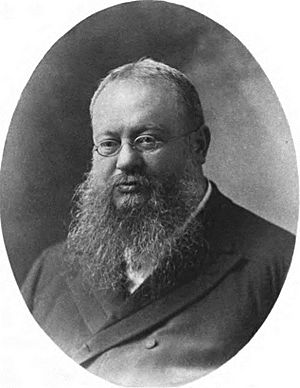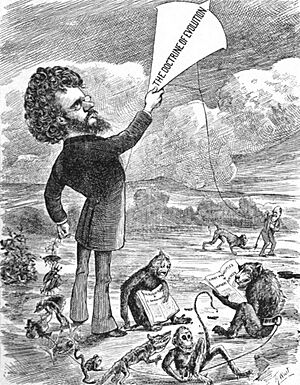John Fiske (philosopher) facts for kids
Quick facts for kids
John Fiske
|
|
|---|---|
 |
|
| Born |
Edmund Fiske Green
March 30, 1842 Hartford, Connecticut, United States
|
| Died | July 4, 1901 (aged 59) Gloucester, Massachusetts, United States
|
| Era | 19th-century philosophy |
| Region | Western philosophy |
|
Influences
|
|
| Signature | |
John Fiske (born March 30, 1842 – died July 4, 1901) was an American thinker and historian. He was known for explaining complex ideas about evolution and for writing many books on American history.
Contents
The Early Life of John Fiske
John Fiske was born Edmund Fiske Green in Hartford, Connecticut, on March 30, 1842. His father, Edmund Brewster Green, was a newspaper editor. His mother was Mary Fiske Bound.
Sadly, his father died in 1852. A few years later, in 1855, his mother remarried. When she did, Edmund Fiske Green decided to take the name of his great-grandfather, John Fiske.
As a child, John Fiske was very bright and learned things quickly. He lived in Middletown, Connecticut, before going to college.
Education and Career Beginnings
John Fiske went to Harvard College and graduated in 1863. He then studied law at Harvard Law School, finishing in 1865. Even though he became a lawyer in 1864, he never actually worked as one.
His writing career started early, in 1861, with an article in a magazine. After that, he wrote often for magazines in both America and Britain.
From 1869 to 1871, he taught philosophy at Harvard. He also taught history there in 1870. Later, he worked as an assistant librarian at Harvard from 1872 to 1879.
Lecturing and Historical Work
After leaving his librarian job, John Fiske was chosen to be on Harvard's board of overseers. He served for six years and was re-elected in 1885.
Starting in 1881, he gave yearly lectures on American history at Washington University in St. Louis, Missouri. By 1884, he became a professor of American history there. However, he continued to live in Cambridge, Massachusetts.
He also lectured on American history in London in 1879 and 1880. John Fiske gave hundreds of lectures, mostly about American history, in major cities across the United States and Great Britain. In 1884, he became a member of the American Antiquarian Society, a group dedicated to preserving American history.
Ideas on Evolution and Society
Most of John Fiske's life was spent studying history. However, early on, he became very interested in how humans progress. This led him to study Charles Darwin's ideas about evolution.
Fiske became well-known for explaining Darwin's work to the public. He wrote many books and essays about the philosophy behind evolution. His ideas were also shaped by Herbert Spencer's views on evolution. Charles Darwin himself once wrote to Fiske in 1874, praising him as a very clear thinker and writer.
During the 1800s, some scientists, like Darwin's cousin Francis Galton, believed that brain size showed how smart people were. This led Fiske to think that the "Anglo-Saxon race" was superior.
However, Fiske was also strongly against slavery. He supported the abolitionist movement, which worked to end slavery. He was so against slavery that even years after the American Civil War ended, he celebrated the North's victory.
In his 1884 book, The Destiny of Man, Fiske wrote about how human society changes. He believed that social conditions had reduced the impact of natural selection on people. He saw this as a very important development for humanity.
Religion and Science
In books like Outlines of Cosmic Philosophy, Fiske tried to show that religion and science were not truly in conflict. He believed they had always been in harmony.
He wrote that he saw Christianity as his "own religion." He felt it was important for many people and didn't believe in attacking it. He thought that Christianity and science could exist together peacefully.
Later Life and Legacy
John Fiske was a popular speaker on these topics early in his career. Later, he focused more on writing history books, such as The Discovery of America (1892).
He also worked with James Grant Wilson to edit Appletons' Cyclopædia of American Biography (1887), a large collection of biographies of famous Americans.
John Fiske passed away on July 4, 1901, in Gloucester, Massachusetts. He was said to have been worn out from too much work. His writings helped many people understand complex ideas about history and evolution.
See also
 In Spanish: John Fiske para niños
In Spanish: John Fiske para niños
 | Victor J. Glover |
 | Yvonne Cagle |
 | Jeanette Epps |
 | Bernard A. Harris Jr. |


